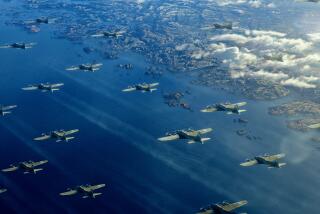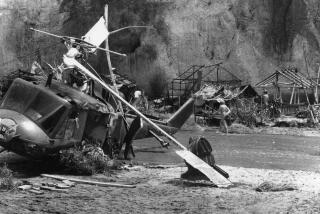Cameraman Faults Landis for Not Rehearsing Enough
- Share via
A cameraman for the “Twilight Zone” movie testified Tuesday that he was surprised that only one rehearsal was held for the final, spectacular battle scene, particularly since his own camera did not seem to be positioned correctly during the dry run.
“I would have assumed . . . that under a shot of this magnitude and of this importance, and with the amount of danger present, with all the various variables, that (the rehearsal) would be done until it was done correctly to all cameras,” witness Michael Scott told a Los Angeles Superior Court jury.
Actor Vic Morrow and child actors Renee Chen, 6, and Myca Dinh Lee, 7, were killed in July, 1982, when a helicopter crashed on them during the filming of the Vietnam battle scene involving numerous explosions.
Criticism Voiced
Scott, who has worked in the movie industry for 17 years, was far more critical of Landis during a hearing held Tuesday morning outside the presence of the jury.
Describing Landis as a “yeller and screamer” who barked orders over the walkie-talkie in such a loud voice that his words were often distorted, Scott said he believed the director behaved irresponsibly in connection with the last scene.
“I felt it was a very dangerous scene with all those hazards. . . . I had no sense whatsoever that the people running the operation had any sense of responsibility for anyone involved,” he testified.
Scott, who was shooting from atop a cliff at Indian Dunes Motorcycle Park, was so worried that the force of an explosion might knock him over or cause the site to crumble that he tied himself to two trees and told his assistants to move away, he said.
Deputy Dist. Atty. Lea Purwin D’Agostino declined to comment when asked outside the courtroom why the witness did not repeat all of his testimony while jurors were present. But a source close to the case said Judge Roger Boren in a private conference with attorneys forbade the prosecutor from asking Scott his opinion of the scene.
Not Asked for Opinion
Before jurors were brought into the courtroom, defense attorneys had argued that Scott was not qualified to assess whether such a scene was safe. During his afternoon testimony, Scott never was asked his opinion of the scene’s safety.
Boren instructed the jury that Scott’s testimony should only be applied to Landis. Landis’ co-defendants are production manager Dan Allingham, helicopter pilot Dorcey Wingo, associate producer George Folsey and special effects coordinator Paul Stewart. They are on trial for involuntary manslaughter in connection with the actors’ deaths.
In another development Tuesday, Boren reversed an earlier ruling and said the prosecution may present evidence that live ammunition was used on the set several days before the helicopter crash.
Question of Recklessness
The prosecution hopes this testimony will show that there was a pattern of recklessness on the set. Defense attorneys have sought to exclude this testimony, saying it would prejudice their case.
During his testimony, Scott said he informed Landis that he had been unable to see both the helicopter and the stand-in actors through his camera lens during the rehearsal 20 minutes before the final shot. “I told him it didn’t work,” said the cameraman, who has worked on such films as “Ruthless People” and “Star Trek III.”
But he stopped short of asking for a second rehearsal, he said, because he was a newcomer to the set and did not wish to jeopardize his future employment. “When you come onto a set and you’re the new man, frankly, you don’t want to rock the boat,” he testified.
Under cross-examination, the cameraman acknowledged that he got the correct shot when the actual filming began, just as Landis had assured him he would.
More to Read
Sign up for Essential California
The most important California stories and recommendations in your inbox every morning.
You may occasionally receive promotional content from the Los Angeles Times.













